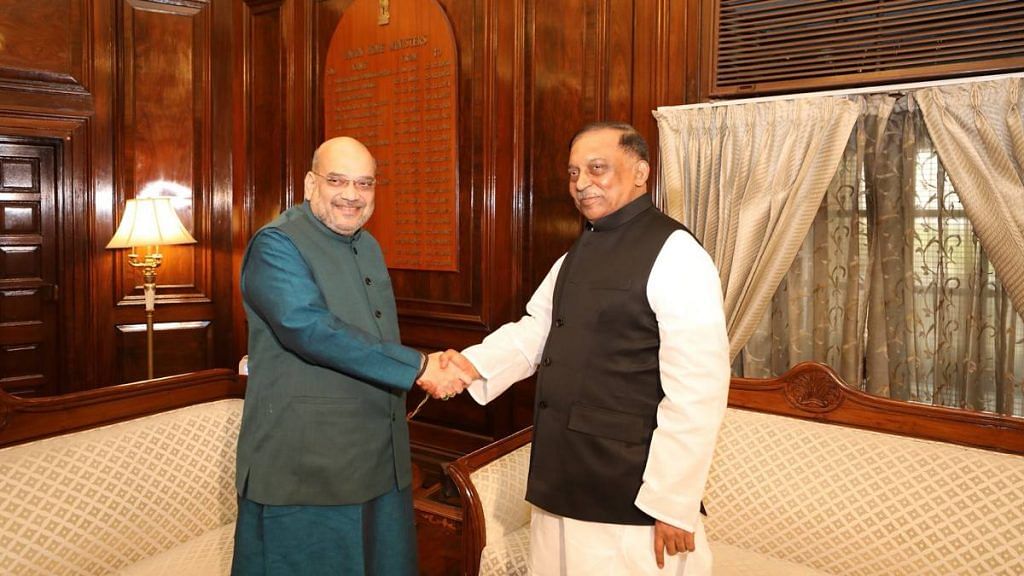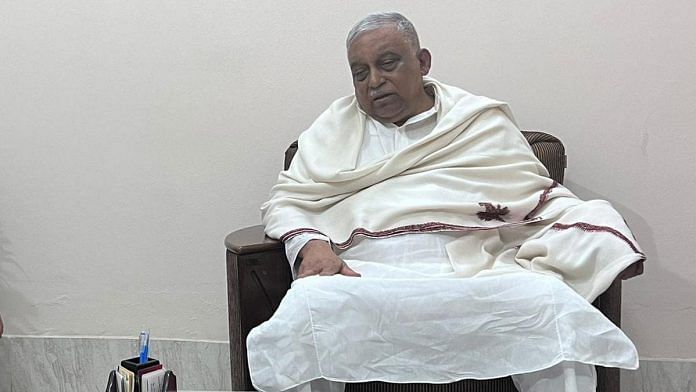Dhaka: India-Bangladesh ties may be in the midst of a “sonali adhyay” (golden era), with Bangladeshi Prime Minister Sheikh Hasina set to attend the G20 summit in India in September. But a pressing concern looms large: the safety of Bangladesh’s Hindu population.
Each time there’s an attack on Hindus or their temples, the focus shifts to the Sheikh Hasina government’s secular credentials and on what Bangladeshi Home Minister Asaduzzaman Khan is doing to address the issue. With Bangladesh expected to go to polls in January 2024, the scrutiny is only growing.
While there is a prevailing perception in Bangladesh that Asaduzzaman Khan tends to be reserved on the issue, he was forthcoming and unequivocal during three interactions with ThePrint between November 2022 and April 2023
“Protecting Hindus is our priority, and we will not allow terror to succeed,” he said, for instance, in an April interview, two months after 14 Hindu idols were vandalised in Bangladesh’s Thakurgaon district.
With general elections on the horizon, here’s a look at Khan’s views on the ruling Awami League’s approach towards Hindus, his belief that “communalism” is being fuelled by the Jamaat-e-Islami (the country’s largest Islamist political party), and the discussions he had with his Indian counterpart Amit Shah during a conference on counter-terrorism financing— a meet that, unusually, was not followed by a joint press conference.
Also Read: Jihadists in Bangladesh are still going strong. Economic gains aren’t ‘wins’
Breaking the silence
In Dhaka’s media circles there is a running joke about how the Bangladesh Home Minister tends to respond when asked about any incident of communal violence or disharmony.
Ask for his reaction, he will say: “Yes, I have heard about it.” Prod him further and he will tell you: “The matter is being investigated.” And as a parting shot: “Will let you know when the investigation ends.”
A former soldier from the Mukti Bahini, the military force that fought the 1971 War of Independence against East Pakistan for a secular, democratic Bangladesh, 72-year-old Khan is known to never lose his cool.
However, he does have to take much of the heat every time Hindus are attacked in Bangladesh. And with the polls approaching and a series of troubling incidents taking place over the last couple of years, deflecting the question has been tougher over time.
When ThePrint first spoke to Khan in November last year, it was exactly a year and a month after the Durga puja violence in several parts of Bangladesh.
In this instance, a copy of the Quran was found placed at the feet of a statue of Lord Hanuman at Nanua Dighir Par puja pandal in Comilla district on 13 October, 2021. Subsequently, Muslim mobs launched attacks on Hindu temples, vandalising idols, breaking into Hindu homes, and setting Hindu properties on fire. The violence resulted in the deaths of at least five Hindus, injuries to over 150 people, and damage to around 80 temples.
News of the attacks made it to the international press, and the Bangladesh government had to fight a perception battle to prove Hindus were safe in the country.
While attacks on Hindus have been reported before and after the 2021 Durga puja, this event stood out for the way violence spread across Bangladesh.
With the incident still fresh in memory, Asaduzzaman Khan and Amit Shah, had met on 18 November, 2022, at the third “No Money for Terror Ministerial Conference on Counter-Terrorism Financing” in New Delhi.
When asked then if Shah had asked about the safety of Bangladeshi Hindus, Khan gave a guarded response.
“Your media members were not in the room where we met. There was much that we discussed. If at all this issue came up, it was definitely not what the whole meeting was about,” he’d said.

However, Khan did point a finger at Jamaat, an Islamist party that is experiencing a resurgence in Bangladesh.
“Jamaat shibir (camp) is opposed to the very independence of Bangladesh,” he said, claiming that the group has its roots in the Razakars and Al-Badr Bahini, both groups that collaborated with the Pakistani Army during the 1971 Bangladesh war.
“It is they who targeted and killed the intellectuals of Bangladesh. At present they are banned from participating in the politics of Bangladesh and trust me their number is getting smaller by the day,” he said.
Notably, this June, Jamaat held its first political rally after a gap of about a decade.
If Hasina is secular, why the attacks?
The rise of Jamaat is bad news not just for Hindus in Bangladesh, but also for the ruling Awami League which publicly stands for secular and democratic values.
Given that Asaduzzaman Khan’s party, the Awami League, has been in power for 14 straight years, why are temples still being attacked in Bangladesh?
According to Khan, the reasons date back to when his party was not in power.
“My party, the Awami League, was not in power for 21 long years. In those 21 years, our values were lost, our history was distorted. Bangladesh was not a communal country, we wanted housing for all, education and health guaranteed for all. People of all religions were to have equal rights. But the defeated forces of the Liberation War in 1971 have not retreated yet. They are active,” Khan said. “They want to mar the spirit of the Liberation War. They are repeatedly trying to destroy religious harmony. These attacks are a part of that conspiracy.”
The Bangladesh Home Minister was categorical that he was enforcing stringent action against communal forces.
“We will not tolerate this. As the Home Minister, I have given orders to the police force. They are in the field to catch those criminals. We will identify them and bring them to book as soon as possible. We spoke to people from the local Hindu community. Their safety has been ensured,” he said.
‘Awami League loves the Hindu community’
Every time communal attacks take place, whether the 2021 Durga puja violence or the more recent attacks on Hindu temples, Bangladeshi Hindus question whether they have a political voice.
Hindus make up only 8 per cent of Bangladesh’s population and they practically have no alternative to the Awami League. So, are they being taken for granted by Asaduzzaman Khan’s party?
To this, Khan had a passionate response.
“Our Hindu society was in this country and will always remain in this country. The government has no plan to exclude or deprive them. We have given them priority. They are in top positions, including in foundations, the secretariat and the police department. They hold positions according to merit. The Awami League loves the Hindu community,” he said.
According to Khan, the Awami League “believes in secularism”, and credits this ideology for the party’s support among different communities.
But then, does it not embarrass him that the word terrorism keeps cropping up?
To this, he points to a “conspiracy” to “embarrass” the government.
“Terrorism is a conspiracy hatched against our government. I would say it is created or patronised to embarrass us. The masses of our country never sheltered terrorists. What the terrorists want to establish in the name of Islam is completely wrong. Islam does not support terror,” he said.
Khan added: “We have been able to identify the terrorists and detect their nefarious designs. They try to escape abroad, go to the mountains for training, and then come back. We are able to fight them more effectively now. It is a success of the government, and we will keep fighting terror till it is eradicated.”
The Home Minister emphasised that the Awami League remained committed to the foundational values of Bangladesh, especially given his own background in the Mukti Bahini.
“The war of 1971 shaped me. It also birthed Bangladesh. We wanted a country that belonged to everyone who spoke the Bengali language, Hindus and Muslims alike,” he said. “As long as I stand, what we fought for 1971 will be in me.”
(Edited by Asavari Singh)
Also Read: China’s arms game with Bangladesh getting dangerous. BNS Sheikh Hasina is just a start



